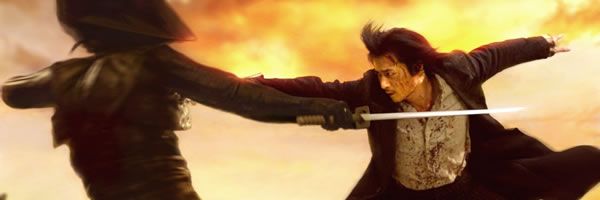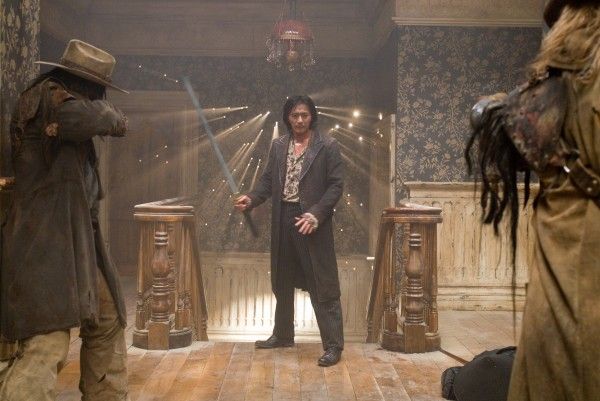The Warrior’s Way is a visually stunning, modern martial arts adventure about the world’s greatest swordsman who abandons his warrior clan to start a new life. Setting up an original fable, first-time writer/director Sngmoo Lee tells the story of Yang (Korean superstar Jang Dong Gun), a mysterious man who decides to spare his last remaining enemy, an infant with whom he flees and seeks refuge in a frontier town in the American West. Once there, Yang unexpectedly finds a kindred spirit in Lynne (Kate Bosworth), orphaned by a horrifying act of brutality carried out by the Colonel (Danny Huston) when she was a child. As he teachers her martial arts and she teaches him how to look after the baby, the two form a surprising bond that strikes a balance between their different cultures.
At an interview during the film’s press day, actor Jang Dong Gun and filmmaker Sngmoo Lee talked about what it was like to bring this tale to life, the extensive fight scenes, the challenges of working with green screen and why this is the right time for Korean films and actors to make an impact in Hollywood. Check out what they had to say after the jump.
And before getting to the interview, you can watch five clips from The Warrior's Way here. It'll give you a feel for the movie.
Question: As the filmmaker, how important was it for you to bring people together from different backgrounds for this film?
SNGMOO LEE: In the beginning, I didn’t know that I was going to have this great cast. Dong Gun was the first one cast, and he’s from Korea. And then, Geoffrey [Rush] was the second one, and then Kate [Bosworth] and Danny [Huston]. Working with this variety of actors from different backgrounds was not intentional, but was great fun and a great help to the final product. It was fascinating to watch Dong Gun and Kate work together, and directing them was a lot of fun. I had actors from Korea, Hong Kong, Hollywood and Australia. It was a great buffet. I really enjoyed working with actors from different cultural backgrounds.
How did you initially conceptualize this story?
LEE: It was a long time ago. The first time I thought about this story was when I studied in New York. Most of the laundry franchises were run by Korean men, but they also happened to be somebody’s professor, somebody’s philosopher and somebody’s former minister. So it was, “What do you know about this guy?” The beginning of this story came from, “What if that laundry man was the deadliest assassin in the East?” And then, when I went back to Korea, I tried to come up with a cross-cultural story between East and West. By telling the most archetypal story, I believe that I’ve covered that story very well. Westerns are the core myth of the Western culture, and the martial arts tradition is a fundamental aspect of the Asian culture, so I just combined them together to tell the audience something interesting that they’ve never seen before. That was the beginning of it.
In writing this script, did you ever stop to wonder how you would be able to make something happen, or did you just let the writing guide where you were going?
LEE: When I first wrote this almost 11 years ago, I knew the budget limitations and I was a first-time director. There was a limit to the imagination because you’re not a filmmaker, if you don’t think about the budget. As the project grew bigger and bigger, then I didn’t really have to think about how much it would cost. There was no way I could figure it out because I’m not a producer. In this case, I didn’t limit my imagination according to the budget. Luckily, the size of my imagination matched the size of the budget.
As a first-time director, what was the most challenging aspect of making this film?
LEE: For me, the most important and difficult thing was setting up the right tone for this. This film is a fable, but we also needed to have a real sense of reality. The emotion that we are going through is real, so we needed to find the right balance between it being a fantasy and being on the realistic story level. Defining that visually and action wise was the most difficult part for me. Acting wise, I asked them to just go over-the-top. This is a fable, so I told them to forget about realistic acting. I didn’t mind cartoon-ish acting. I just watched them and when my gut told me, I told them to try it a little bit less. Defining that threshold was the most crucial, important and difficult part for me, as a director.
Was it difficult to direct in English?
LEE: Even though I lived here and studied here for seven years, English is still my second language, so there are many occasions that I cannot find the right word for something and if I directed in Korean, it would be much easier. But, the actors and the crew members were extremely tolerant and they were very supportive, so it was not much of a problem. The language barrier didn’t really matter that much.
Dong Gun, did you train a lot for this role, with both the stunts and the English?
JANG DONG GUN: I had six months, during the pre-production period, to work on the martial arts and also the English, and I spent a lot of that time on the martial arts. In the case of English, I had to learn how to say things in a way that a warrior from the East would speak, so I had to focus on the accent and the pronunciation.
Were you worried about the actors who were less experienced with stunt work, doing their own work in the fight scenes?
LEE: Dong Gun got hurt during the pre-production, but not on set. There was a professional stunt coordinator and fight choreographer there. Even though Dong Gun has done many action movies, he hasn’t done martial arts movies, but everybody was very physically capable. We were surprised with their capability. Of course, they got bruised here and there, but it was fun.
What are the challenges that come from filming in a green screen environment?
DONG GUN: Acting is about reacting to the other actor that you’re working with. But, in this case, because I was working with a green screen, I had no help from my environment, so I had to rely solely on my imagination, in trying to create a reaction to something that I couldn’t see. That was the most difficult part.
LEE: It was just about watching out for how much is too much. If I saw something that didn’t work, I could make the balance with that performance. You have to imagine everything, but there is a benefit to it. Actors assume the director knows everything, and I just let them think so because I’m the only one who knows otherwise.
What was it like to work with the baby?
DONG GUN: My baby was born two months ago, so if I were to make the film now, I would do a much better job. Before I started shooting, I had to learn in an institute about how to change diapers, how to feed the baby and how to get the baby to go to sleep. Those skills that I learned then have served me a lot better now, for my kid, rather than when I was actually shooting the film.
Did you spend time getting to know the baby before shooting, so that she got used to being with you?
DONG GUN: When I first met the baby, I was in my ninja-like outfit and I was wearing very scary make-up, so she started crying. So, it took quite a long while to get to know her and for her to get used to me. I think it was almost in the middle of the film that she finally warmed up to me. It was a reminder that first impressions are very important.
Did you get to have fun and see any of New Zealand at all, while you were shooting there?
DONG GUN: I think my biggest regret is that New Zealand is a beautiful place that people actually pay money to see and to visit, and all I remember of my time there is that I shot the film.
Would you like to do more Hollywood movies?
DONG GUN: Like I’ve always done, and always will continue to do so, it’s not a matter of where the film is being made. It’s a matter of, “Is it a good film, and do I want to be in it?” So, if I get an opportunity to be in another great film, then of course, I would work very hard and possibly do an even better job than in this one.
Do you think the time is right for Korean actors and films to make an impact in Hollywood?
DONG GUN: With the increase in interest in Korean films within Asia, Korean films have gained a wide audience and a wide fan base, and because they’re so well-liked within Asia, Hollywood started taking an interest. It is a great time for Korean actors and actresses to cross over into Hollywood.


